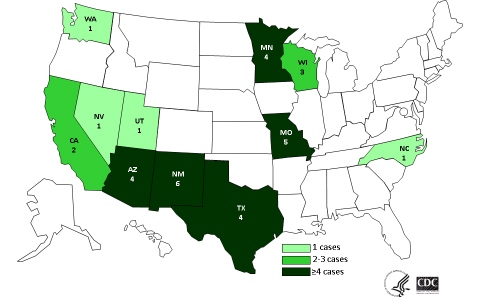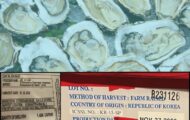The Centers for Disease Control and Prevention have updated the Listeria monocytogenes outbreak linked to commercially produced, prepackaged caramel apples. As of December 30, 2014, 32 people are sick in 11 states. There have been six deaths, and 31 of the patients have been hospitalized.

The case count per state is: Arizona (4), California (2), Minnesota (4), Missouri (5), Nevada (1), New Mexico (6), North Carolina (1), Texas (4), Utah (1), Washington (1), and Wisconsin (3). There are additional cases in California (1), Nevada (1), and New Mexico (1). Nevada has been added to the outbreak state list.
The dates illnesses began range from October 17, 2014 to December 11, 2014. Ten illnesses have been associated with a pregnancy, and one pregnant woman has suffered a fetal loss. Three invasive illnesses of Listeria meningitis have been reported among otherwise healthy children aged 5 to 15 years. Listeriosis contributed to three of the six deaths; it’s unclear whether or not it contributed to two of the deaths. The sixth death was not related to literiosis.
Attorney Fred Pritzker, who has won millions for clients sickened by this pathogenic bacteria, said, “There are many unknowns at this point but if history is any guide, something in the production of this product went horribly wrong. We will find out what happened and who is responsible. I can say this: in this day and age, a Listeria outbreak of this magnitude simply should not happen.”
Three companies have recalled their caramel apples in relation to this outbreak: Happy Apples, California Snack Foods Karm’l Dapples, and Merb’s Candies Bionic Apples and Double Dipped Apples. Bidart Brothers, an apple supplier, informed those companies that their apples may be connected to this outbreak. And Pacific Coast Fruit, which distributes apples to companies in Oregon, southwest Washington and British Columbia, informed their customers today that their apples may also be connected.
The investigation, including traceback and epidemiological research, continues, and there may be more recalls as public health officials learn more about the brands and the outbreak. The recalled apples are no longer for sale in grocery stores, but they may still be in people’s homes as they have a shelf life of about a month.
If you have any commercially prepared caramel apples in your home, throw them away in a sealed container or return to the place of purchase for a refund. Wash your hands thoroughly, then clean the area where the apples were stored with a mild bleach solution.
If you ate any of these apples, or any commercially produced, prepackaged caramel apple this fall or winter, monitor yourself for the symptoms of Listeria monocytogenes for 70 days from the date you ate them. That’s how long it can take for the illness to appear.
The symptoms of listeriosis include flu-like fever and muscle aches, upset stomach, nausea, and diarrhea, stiff neck, headache, loss of balance, confusion, or convulsions, and flu-like symptom in pregnant women. If you ate a commercially prepared, prepackaged caramel apple this fall or winter and develop these symptoms, see your doctor immediately to begin treatment.




